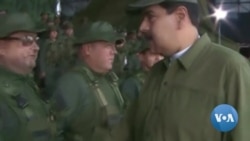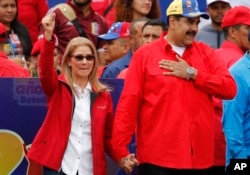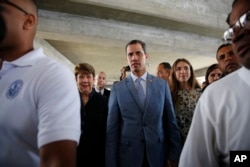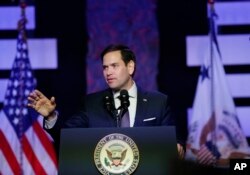The possible use of U.S. military force to oust Venezuelan President Nicolas Maduro raises concerns about the possible costs in lives and unintended consequences that may come from committing American troops to fight and die in another foreign conflict.
U.S. President Trump acknowledged in an interview Sunday the use of U.S. military force in Venezuela is “an option.” But he also emphasized in State of the Union address Tuesday’s to Congress the need to draw down on costly military engagements around the world.
“As a candidate for President, I pledged a new approach. Great nations do not fight endless wars,” said President Trump.
US objective
White House officials have clarified the U.S. objective in Venezuela is the peaceful transfer of power.
Most Latin American and European countries also support Venezuelan opposition claims the Maduro government is now illegitimate, after it barred most opposition candidates from running in last year’s election. These nations have recognized Juan Guaido, the President of Venezuela’s National Assembly, as the country’s interim leader.
In addition to political repression, Maduro’s socialist policies have brought the country with the world’s largest oil reserves to near economic ruin, with hyperinflation, food and medicine shortages, and an exodus of more than three million Venezuelans fleeing the upheaval and poverty in their country.
The Trump administration has relied on increasing diplomatic support for Guaido and economic sanctions that freeze Venezuela’s oil revenues to force Maduro out or persuade the military leadership to remove him from power.
Military justification
Supporters of the military option cite the Maduro government’s alleged involvement in illegal drug trafficking, as well the growing flow of Venezuelan economic refugees in the region as justification. Some Maduro critics say the Venezuelan people would welcome a U.S. led regional effort to force the entrenched leader from power.
“That seems to be a growing popular opinion by many Venezuelans, they view that the only way to get that this criminal government out of power is by a coercive force,” said Ana Quintana, Latin America policy analyst at The Heritage Foundation in Washington.
However military intervention opponents point out the humanitarian crisis in Venezuela does not pose a direct security threat to the United States. And they worry hawks in the Trump administration may be advocating for military solutions to try to resolve complex diplomatic, economic and political problems.
“I think it is very dangerous, because it means that the actions that they propose are far out of proportion of, you know, really what is necessary to preserve us security interests,” said Alexander Main, a Latin America political analyst and director of International Policy at the Center for Economic and Policy Research in Washington.
Senators Marco Rubio (Florida-Republican) and Lindsey Graham, (South Carolina-Republican), two key lawmakers that support increasing diplomatic economic sanctions against the Maduro government, have been reluctant to advocate for military intervention.
Canada and the Lima Group representing most Latin American nations have also cautioned against force to resolve the stand-off in Venezuela.
Guaido recently downplayed the need for U.S. intervention in Venezuela during an interview with VOA in which he said, “We will as a sovereign Venezuelan people do what is necessary to achieve stability in our country.”
Maduro has criticized Trump for threatening the use of military force in his country and said Venezuelans would resist U.S. aggression.
"And who do you think you are? The emperor of the world? Do you think that Venezuela is going to give up and will obey your orders? Well for your information, Venezuela does not give up! Venezuela keeps going!” Maduro said at a recent pro-government rally.
Troop deployment
White House National Security Adviser John Bolton first raised alarm about deploying U.S. forces to the region when he carried a notepad with a handwritten notation saying “5,000 troops to Colombia” during a news briefing about Venezuela oil sanctions.
“You could imagine a possibility that if there is a need to go into Venezuela and do humanitarian operations, or need to go into Venezuela to do other types of operations such as protecting the members of the Guaido government or members of the National Assembly at risk,” said Evan Ellis, a research professor of Latin American studies at the Strategic Studies Institute of the U.S. Army War College.
But a U.S. military intervention in Venezuela could fracture support from Latin American counties that have been critical of past U.S. interventions in the region and could bolster Maduro’s image in Venezuela as a sympathetic and anti-imperialist leader.
“If the White House's goal is regime change in Venezuela, which appears to be the case, then they should be concerned that their actions are generating a backlash against the U.S. in Venezuela and in the region,” said Main.
The United States invaded Grenada in 1983 and Panama in 1989, two small Latin American countries, with limited military operations. But analysts caution a U.S. intervention in Venezuela, which is twice the size of Iraq and densely populated, could require a significant and sustained U.S. military commitment to succeed.












